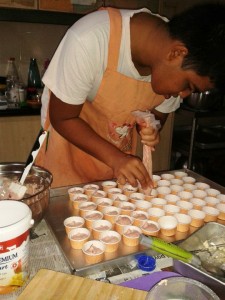Bake4Fund is a small home-based social enterprise and our main focus is to provide work and training opportunities to young people with learning difficulties. However, after reviewing the takings from our baking frenzy which began with the Christmas season right up to Chinese New Year, I had the unsettling feeling that “baking may not be the right business” if we are talking of sustainability because of critical factors like supervision, product quality and rising costs.
Nicholas has been baking since he was 11 years old. Today he knows exactly what to do and the ingredients that are required for either the cakes or cookies. However, he still needs supervision because he has the tendency to hurry. A friend, TL, if left unsupervised, will over-mix and over-work the ingredients. Then, there is BJ who likes to add ingredients as and when she likes. So persons with learning difficulties can work successfully but they will need firm and supportive supervision. A supervisor has to literally keep an eye on the activities and emotions in the room and, give the necessary breaks to specific persons. Some people with learning difficulties can work long hours while some need many ‘breaks’ in between. Aside from wages for the bakers, we have to also set aside wages for at least one supervisor.
Rising costs affect our operation. Almost all the ingredients we use in baking have gone up in price. Our main ingredient, butter has skyrocketed, so have nuts like almond and walnuts which have shot up from around RM42 to RM54 for a kilogram. Packaging materials like boxes and containers have also increased. Water and electricity are not getting any cheaper either. We have improved on our steps and reduced wastage but there is not much else we can do. We continue with Bake4Fund because we see that it provides many opportunities for physical, social and emotional development for people with learning difficulties.
Personally, I think they like to do things, especially with their hands. Nicholas is happy to bake because he gets to move around and is actively using his hands, sight, smell, hearing, touch and taste (at the end). And all the movements, from big to small, help to create new experiences and learning, thereby developing better abilities and strengths. We can see a cycle of improvement with our bakers. The more they bake, the less mistakes they make and that helps to develop greater self-confidence which then encourages more learning to take place. And our cakes and cookies continue to get better and better. Today we have many great days, good days and really very few bad days.
Although our initial naive vision was to create opportunities for greater financial independence, the reality is that, baking is very labour intensive and slow. The years also taught us that we ought to have young people with no learning difficulties as baking buddies. I noticed that when I rope in my daughter as a baking buddy, work progresses faster because there is personal supervision, but that again translates into bigger space and cost.
We realised that what we made from the sale of our cookies and cakes is far from enough for us to set up a centre and be self-sustaining. We have driven ourselves into a “chicken and egg” situation where we wondered whether we could do better if we have, for example, a bigger space and then again perhaps a bigger demand should come in first, and round it goes. Bake4Fund is still looking for the balance.
To date we are thankful to some of our clients like the Xiao En Centre that shared our vision of providing work opportunities to people with learning difficulties. They have been our main client for the past five years.
Then, as recently as two years ago, a construction company, Pembinaan Jemerlang Sdn. Bhd., started ordering our cookies and cakes as door gifts for their annual dinner and as part of their year-end corporate gift hampers.
Although we have been moving with some starts and stops, Bake4Fund continues to be hopeful that we would be able to set up a baking centre that is self-sustaining which can provide an environment that helps the learning disabled to thrive and have greater self-independence.
“Three grand essentials to happiness in this life are something to do, something to love, and something to hope for”. Joseph Addison


